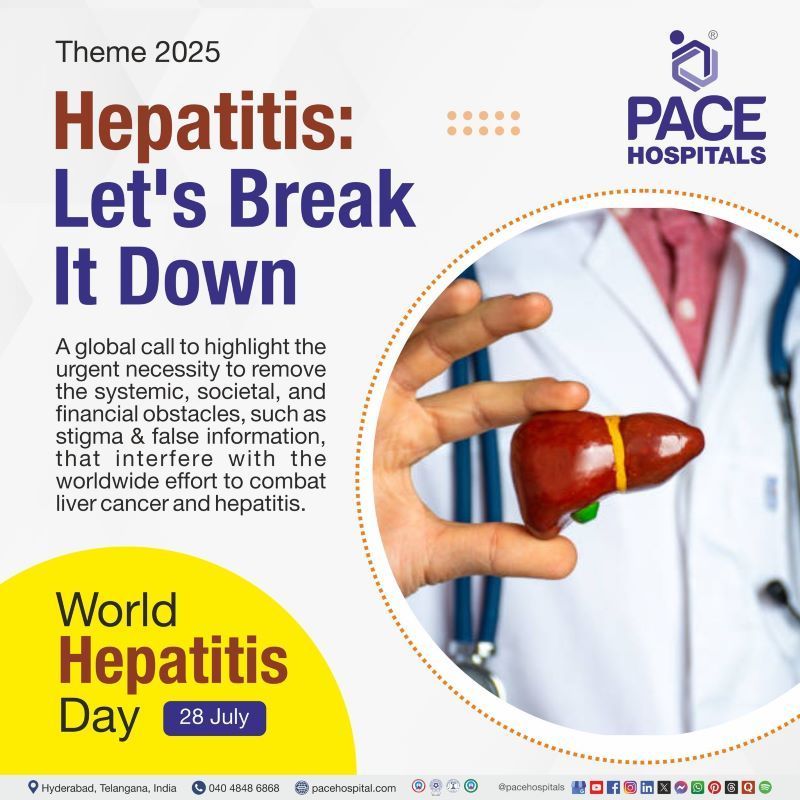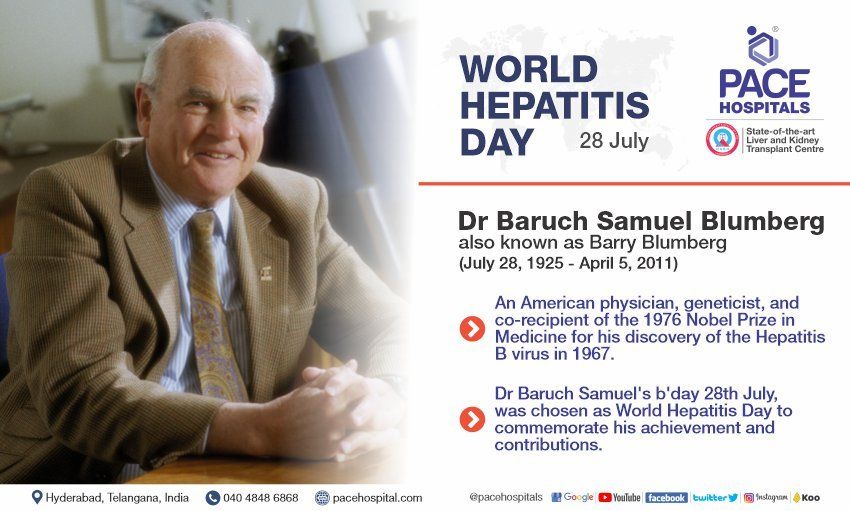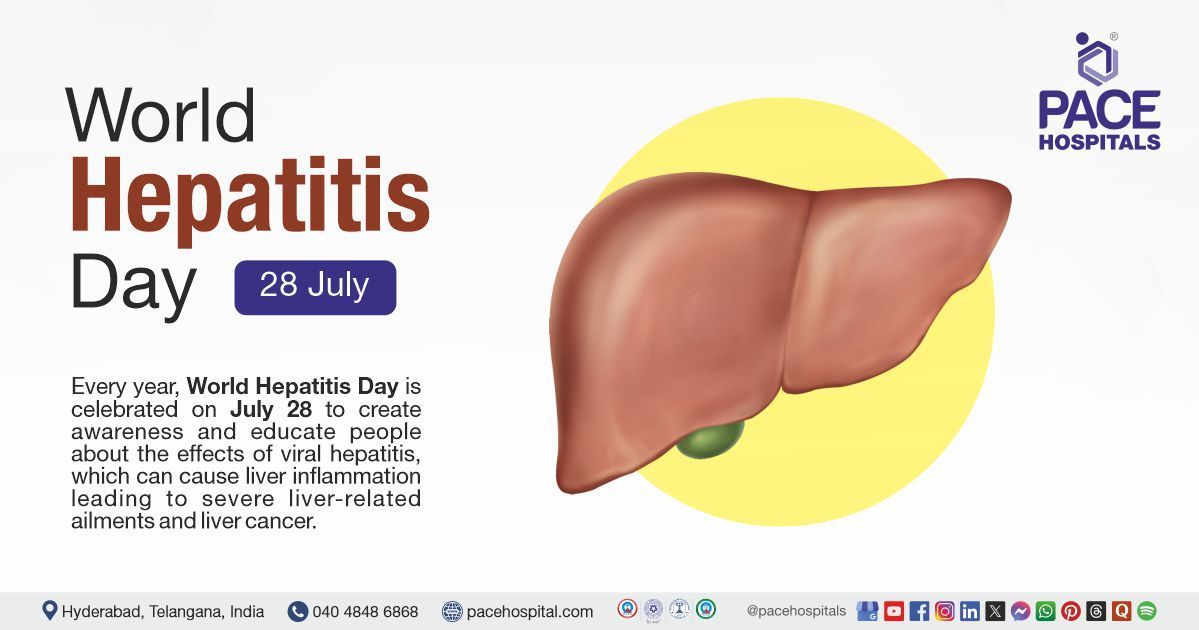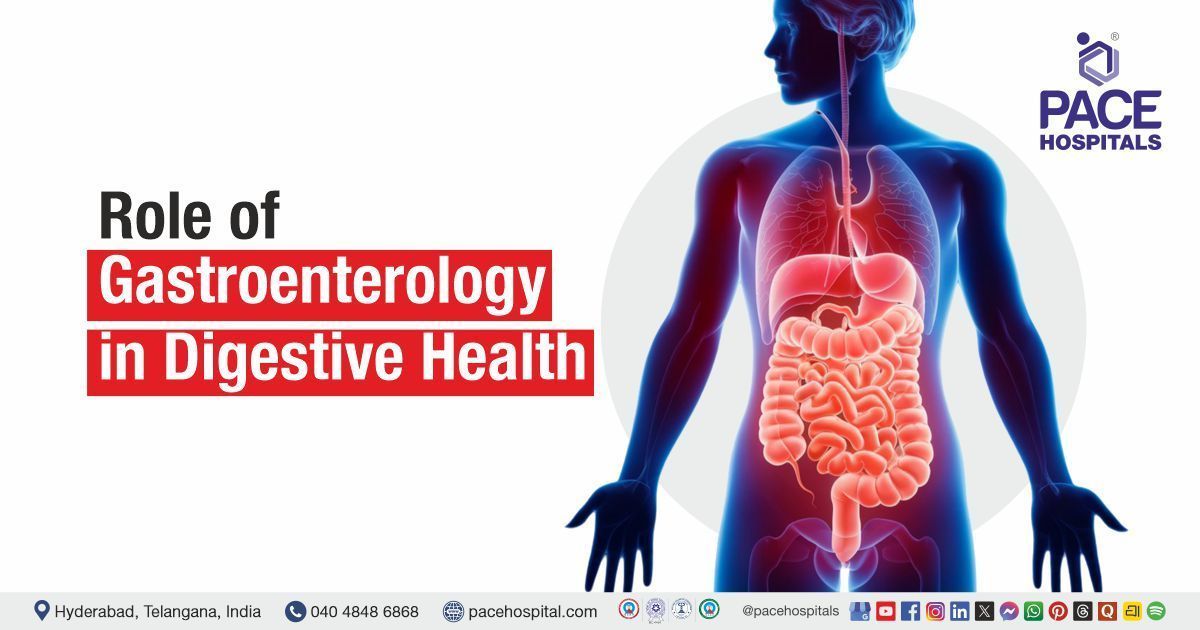World Hepatitis Day, 28 July 2025 - Theme, History & Importance
PACE Hospitals
Every year, World Hepatitis Day is celebrated on July 28 to create awareness and educate people about the effect of viral hepatitis, which can cause liver inflammation leading to severe liver-related ailments and liver cancer.
These days, a team of WHO, expert scientists and policymakers of a few countries are dealing with the upsurge of anonymous acute hepatitis and putting their efforts into understanding the cause of this infection, which is affecting mainly children. There are indications that this infection is not due to the existing five known hepatitis viruses (A, B, C, D and E).
Most acute hepatitis infections cause mild illness and sometimes go undetected. But sometimes, it raises fulminant liver disease and can be fatal, further it may require liver transplant. It is estimated that 78,000 people worldwide died from acute hepatitis A-E infection complications in 2019 alone.
Globally, the primary focus is to eliminate hepatitis B, C and D infections. Unlike acute viral hepatitis, these three infections cause chronic hepatitis that lasts for several years and culminates in more than 10 Lakhs of deaths per year from cirrhosis and cancer of the liver.
These three chronic hepatitis infections are responsible for more than 95% of hepatitis mortality worldwide. Though we have the guidance and tools to diagnose, treat and prevent chronic viral hepatitis, these services are often out of reach in communities and sometimes only.
On World Hepatitis Day 2025, WHO highlights the need to take necessary steps to scale up the diagnosis, prevention, and treatment of liver disease, thereby achieving hepatitis elimination goal 2030.
WHO has set up a goal to achieve hepatitis elimination by 2030. To achieve this, the WHO urges countries to achieve specific goals.
- Reduces new infections of hepatitis B and C by 90%.
- A 65% reduction in hepatitis-related deaths from cirrhosis and cancer.
- Make sure that at least 90% of people infected with hepatitis virus (B and C) are diagnosed.
- At least 80% of eligible individuals receive appropriate care.
- Provision of chronic hepatitis B treatment access to all pregnant women and birth vaccines to their infants in order to prevent hepatitis B virus (HBV) infection.

World Hepatitis Day 2025 Theme
This year, 2025, the World Hepatitis Day theme is "Hepatitis: Let's Break It Down”. This theme highlights the urgent necessity to remove the systemic, societal, and financial obstacles, such as stigma and false information that interfere with the worldwide effort to combat liver cancer and hepatitis. It is recommended that hepatitis services, including vaccination, testing, and treatment, be simplified, scaled up, and integrated into national health systems to eliminate hepatitis as a public health threat by 2030.
Year-by-Year Themes for World Hepatitis Day (WHD):
- World Hepatitis Day 2024 theme: It's time for action
- World Hepatitis Day 2023 theme: One Life, One Liver.
- World Hepatitis Day 2022 theme: Bringing Hepatitis Care Closer to You.
- World Hepatitis Day 2021 theme: Hepatitis Can't Wait.
- World Hepatitis Day 2020 theme: Hepatitis-free Future.
- World Hepatitis Day 2019 theme: Invest in Eliminating Hepatitis.
- World Hepatitis Day 2018 theme: Test. Treat. Hepatitis.

History of World Hepatitis Day (WHD)
Dr Baruch Samuel Blumberg also known as Barry Blumberg, a physician and geneticist, discovered the hepatitis B virus in 1967 and developed the first hepatitis B vaccine, for which he was awarded the Nobel Prize. 28th July, his birthday, was chosen as World Hepatitis Day to commemorate his achievement and contributions.
World Hepatitis Day is among the eight official world health days designated by the World Health Organization. This annual event focuses on the devastating impact of viral hepatitis infection, with nearly 33 crores people worldwide affected with chronic hepatitis B or C.
A hepatitis-related awareness event was first observed on October 1, 2004 as "International Hepatitis C Awareness day" organised and coordinated by different European and Middle Eastern Patient Groups, later on this event was celebrated on different dates by these groups. To consolidate the effect of this event, in 2008, World Hepatitis Alliance in coordination with different patient group declared May 19 as the first global World Hepatitis Day.
Later on, a resolution was passed during World Health Assembly in 2010 to change the date to July 28 to honour the work of Dr Baruch Samuel Blumberg. The aim was to designate this particular day to create awareness and educate people about viral hepatitis as a global public health problem worldwide.
Importance and Significance of World Hepatitis Day (WHD)
World Hepatitis Day raises awareness of viral hepatitis, an inflammation that causes liver ailments and related cancers. Out of the five main strains of the hepatitis virus: hepatitis B & C are the most common cause of death, killing 13 lakh people each year.
Together, we can achieve a hepatitis-free future.
- Prevents neonates infections by promoting vaccination against hepatitis B and giving at least two boosts.
- Stopping transmission from mother to child. All pregnant women should be consistently tested for hepatitis B, HIV and syphilis and treated as needed.
- Do not leave anyone behind. Everyone needs access to hepatitis prevention, testing and treatment services, including those who inject drugs, those in prison, immigrants, and other high-impact people.
- Increase access to testing and treatment. Timely testing and treating viral hepatitis can prevent liver cancer and other severe liver diseases.
- Maintain mandatory hepatitis service during COVID-19. Hepatitis prevention and care services, such as infant immunization, harm reduction services, and ongoing treatment of chronic hepatitis B, are also essential during a pandemic.
What is Viral Hepatitis?
Hepatitis is an inflammation and damage to the liver. Viral infections are the most common cause of hepatitis.
Hepatitis has five main viruses: A, B, C, D and E. The severity of the disease and the treatment to be followed depends on the type of hepatitis and the individual. It can cause liver cirrhosis or cancer. Hepatitis exhibits as yellow discolouration of the skin (jaundice or jaundice), dark urine, nausea, vomiting, and abdominal pain.
Who is at risk for Hepatitis?
People who indulge in the following activities are at higher risk for hepatitis:
- Sharing needles to take medicine.
- Perform unprotected oral and anal sex.
- Having multiple sex partners.
- Drink a significant amount of alcohol.
- Having poor nutrition.
- Work in a hospital or nursing home.
- Receiving long-term kidney dialysis.
- Travel to areas with poor sanitation.
Prevention of Hepatitis Virus
There are many ways to reduce your chances of getting hepatitis:
- Get vaccines for hepatitis (A and B).
- Use a condom during sex.
- Do not share needles to take medication.
- Maintaining personal hygiene, such as washing hands thoroughly with soap and water.
- Do not use the personal belongings of an infected person.
- Be aware while getting tattoos or body piercings.
- Make sure you are vaccinated when travelling to areas of the world with poor sanitation.
- Drink bottled water during your travel
You must take these precautions if you participate in risky behaviour. Take precautions, too, if you work in nursing homes, dormitories, day-care centres, or restaurants where you have been in contact with other people for a long time and are at risk of developing an illness.
Share on
Request an appointment
Fill in the appointment form or call us instantly to book a confirmed appointment with our super specialist at 04048486868
Appointment request - health articles
Recent Articles











